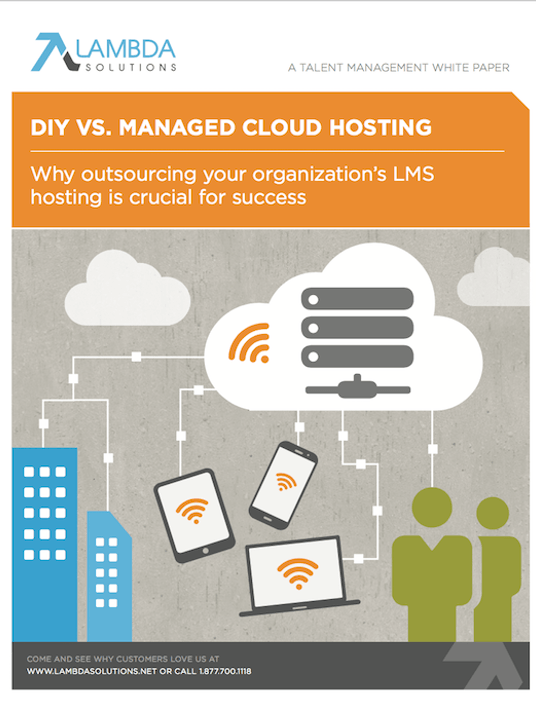Do-It-Yourself Vs. Managed Cloud Hosting: Which Is The Best Option For Your Organization?
In the first part of this article, we explored some of the benefits and drawbacks of DIY or outsourced hosting. To make sure you make the best choice for your organization’s Learning Management System, keep reading.

Trans-Geographic Data And Disaster Management
Having your data stored in multiple geographic locations or ‘trans-geographically’ is beneficial for multiple reasons. One reason may be that you are a small firm that operates globally. If this is the case, in order to ensure fast uploading time on your LMS, it is imperative to have your data stored in multiple places within the countries you operate. The costs to achieve this are astronomical if hosting is not your firm’s core capability. Another benefit may be that if you are a firm that conducts business in the European Union. Under the EU Data Protection Directive, businesses that operate within this continent are required to store their data within the EU. Since managed cloud hosting firms already store data in multiple countries, it is highly likely your organization will be covered but be sure to ask before you sign on.
Another advantage of managed cloud hosting is that the costs for additional data centers are included in the hosting agreement. At a fraction of the cost, managed cloud hosting firms can store your data in your desired foreign markets. Furthermore, many managed cloud hosting firms provide disaster recovery and business continuity services from remote sites enabling quick recovery following disasters. In the case of a disaster, having servers in different physical locations can mean the difference between a database being briefly unavailable and database being gone for good.
Technical Support: 24X7
In a true DIY hosting environment, IT managers and their team are responsible for fixing server and hosting problems when they arise. Most firms cannot afford to pay IT specialists around the clock so an additional benefit of outsourcing hosting is 24/7 technical support and 99% uptime. Due to the fact that many organizations in different time zones rely on third-party hosting from a single firm, IT specialists have full administrative control over the server around the clock. Equipped with 24/7 chat support, unexpected hosting issues are dealt with promptly when a firm outsources their hosting. With 99% uptime, you can rest assured knowing that students or staff who rely on your learning management system will be able to experience uninterrupted and accessible learning all day everyday.
Keeping Up With Innovation
Many organizations that choose DIY hosting do so because they have an infatuation with owning innovative technologies that drive business forward. Having industry standard, cutting-edge hosting, requires a significant commitment to stay ahead of the curve (aka, your competitors). In the business of hosting this entails spending significant time learning new technologies and researching/buying the latest equipment.
According to Moore’s law, the number of transistors on an integrated circuit will double every two years. This means that technology will continue to evolve towards greater speed and responsiveness forcing companies to invest in hosting. Specialization of managed hosting firms allows for a platform that is constantly up to date with new servers and networking infrastructure to provide your learning management system with optimal speed and performance. As the demands of critical applications and user expectations continue to grow year after year, managed hosts remain dedicated to keeping up with innovation in order to remain competitive.
Unlike most DIY hosting systems, a managed cloud hosting firm benefits from being able to purchase equipment in bulk through special arrangements with equipment suppliers. Given that managed hosting is their area of expertise and research, managed cloud hosting firms are more likely to make good product decisions at a lower cost.
Managed Hosting For The Win
If your company is large enough and has the in-house IT resources to afford the costly capital and maintenance costs of DIY hosting, then this may be the strategic choice. If your organization is like most, the asset costs and technical expertise that is required to build and manage cutting-edge cloud hosting is financially crippling.
The cost and complexity of managing applications and their hosting can be avoided with managed infrastructure and hosting that offers the size, scale, and expertise that most private organizations cannot afford. If DIY cloud hosting is something your business is seriously considering, it is highly advisable to run a cost vs. benefits analysis of both options. While managed cloud hosting will almost always prove to be the cleanest solution, there are isolated scenarios where this may not be the case. For most businesses, the overall management and maintenance provided by managed hosting is of higher quality and less costly than managing the infrastructure internally. Managed hosting allows businesses to focus efforts and resources to their core competencies allowing them to focus on what they do best. Be an early adopter and stay ahead of your competitors by opting for managed cloud hosting.
Related Articles:
- Free eBook: DIY Vs. Managed Cloud Hosting
- DIY Vs. Managed Cloud Hosting (Part 1): Cost, Security, And Scaling Infrastructure








